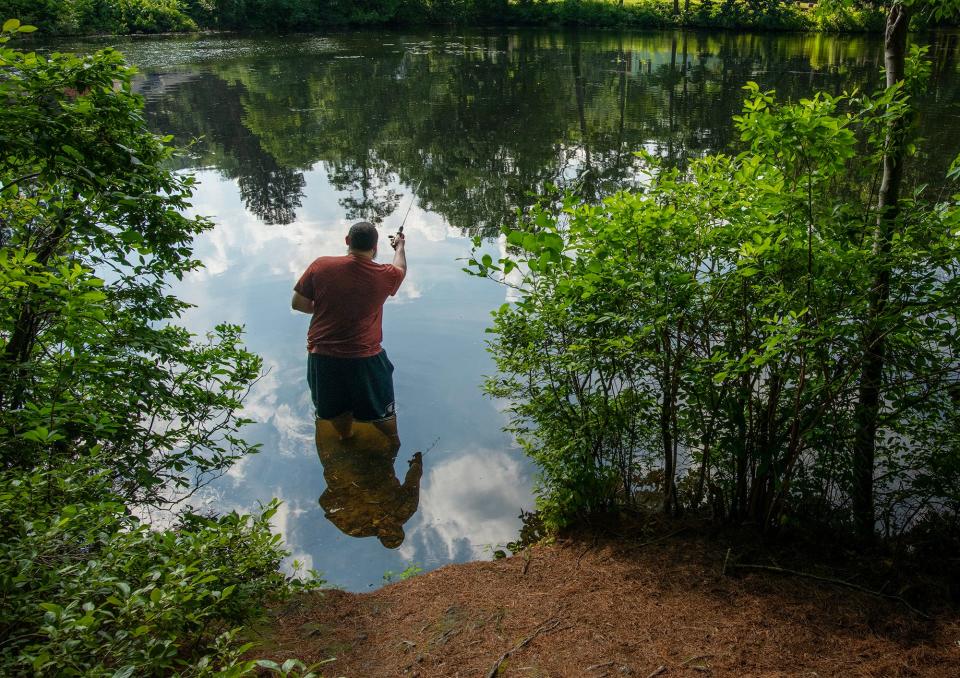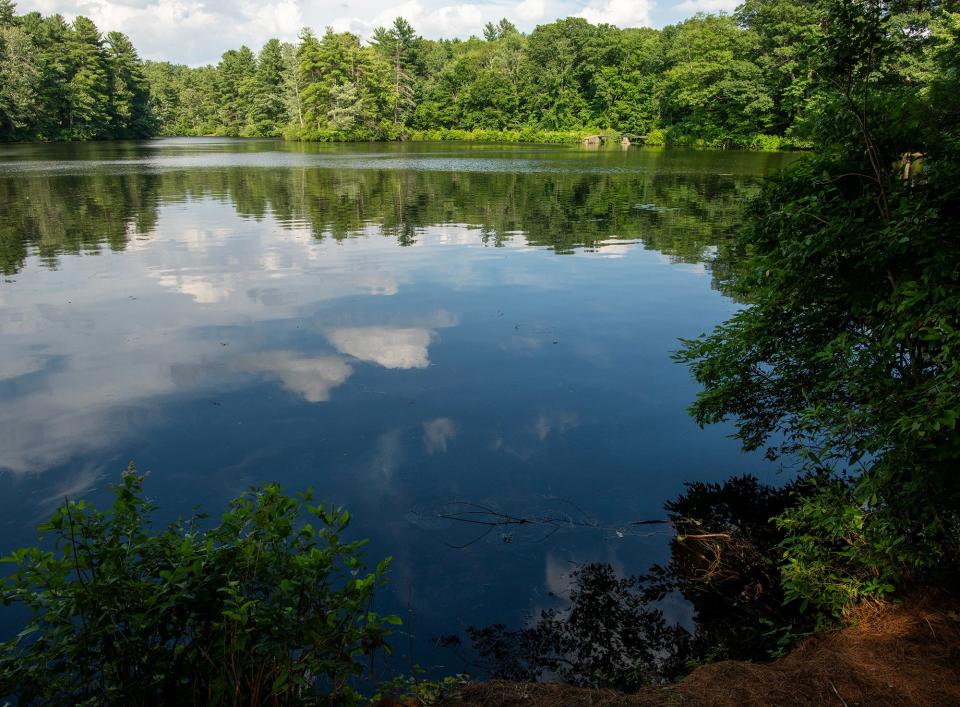Worcester put on alert: Take closer examination of herbicide use in lakes, ponds
WORCESTER — Elsie Uffelmann compares Worcester’s use of chemicals in its lakes and ponds to efforts more than a decade ago to bring a gambling casino to the city.

Worcester passed on the opportunity, and Uffelmann, who has lived in the city for more than 40 years, believes the coming together to reject a casino is the same mindset that's needed when it comes to the use of chemicals to kill invasive weeds in Worcester's water bodies.
“Everyone coalesced, all joined together to say, ‘What are we doing here, let’s stop and think,’” said Uffelmann about the casino proposal that encountered community opposition. “We’re now awash in a sea of chemicals as a culture. The city is paying a lot of money for that.
“This is something everyone can be on board with, like we were with the issue of bringing a casino into Worcester. Everyone coalesced around that, and what we do with our waterways is crucial.”
Letter of opposition
Uffelmann is one of more than 30 Worcester residents who signed a letter of opposition to "widespread" use of chemicals in Worcester's lakes and ponds. The letter was delivered on Tuesday to city officials, said Uffelmann.
Herbicides are being used without adequate attention given to health risks to humans and water bodies, said the letter. It also claims there isn't enough consideration given to nonchemical alternatives.
The city declined a request to interview Katie Liming, Worcester’s lakes and ponds coordinator, for this story. Liming is expected to respond to resident concerns about herbicide use during Monday’s meeting of the Green Worcester Advisory Committee, according to a city spokesman.
Uffelmann has appeared several times before the committee to express her concerns, and it appears some members are listening. "I think her concerns are founded, and we and the city owe her and the general community answers," said committee member Mary Leovich.
In remarks to the Green Worcester Advisory Committee in May, Liming said all herbicide applications in Worcester are done at concentrations permitted by the state, and the goal is to apply them at much lower levels than the allowed maximum.
She emphasized to the committee that the city is "... only using herbicides when there's no other good option," and said surveys done after chemical treatments have not shown any dead fish or other negative impacts on wildlife.
City must consider alternatives to chemicals
Uffelmann is dogged in her belief that the city must consider alternatives to chemicals. She lives close to Cooks Pond, a 22-acre body of water in Tatnuck owned and managed by Smith’s Pond Corp. It's a private entity with a water-quality committee of volunteers, one of them being Uffelmann.
“(Uffelmann) is constantly pushing us to use manual removal and not use chemicals,” said Peter McKone, a Smith's Pond Corp. officer. “She’s a well-meaning person, standing up for something she believes in.”

Smith’s Pond Corp. hired a company in 2020 that used the herbicide fluridone to kill invasive plants in Cooks Pond and another herbicide treatment was applied in 2021. However, it appears the plants have returned, according to a recent survey by Worcester State University students.
Uffelmann worries about the potential health problems that chemicals pose for humans and aquatic life. She points to studies that conclude herbicides derived from fossil fuels are endocrine disruptors that can result in developmental malformations, interference with reproduction and increased cancer risk.
A study published in March in the New England Journal of Medicine concluded an “urgent” need for the medical community to address the growing burden of exposure to endocrine-disrupting chemicals to prevent a broad range of health problems. The EPA reports these chemicals can kill fish, disrupt their reproductive systems and limit their food supply by destroying aquatic plants.
'Putting the cart before the horse'
Tuesday’s letter raised several issues, including why is the city spending money on chemicals when it doesn’t have a comprehensive watershed management plan. “It’s like putting the cart before the horse,” said Uffelmann.
The letter also noted that since there’s an incomplete picture of the health risks from chemicals, why isn't Worcester prioritizing nonchemical methods, who decides how invasive plants are removed, do they have the necessary expertise and are they free of potential conflicts of interest?
Addendum: more info needed
Uffelmann said she sent an addendum to city officials on Tuesday to Liming's report in May about lakes and ponds management strategies.
The addendum suggested what it called nontoxic, cheaper methods to destroy invasive plants, including drawing down the water in lakes and ponds during winter to expose plants to harsh conditions; diver-assisted suction harvesting, when divers pull plants from the roots and send them through a chute to a boat to prevent plants from breaking apart and taking root elsewhere; using volunteers on a more robust basis to hand-pull invasive plants like water chestnut; and using benthic barriers that sit on the bottom of a lake or pond to block sunlight and suffocate unwanted plants.
Fluridone: residents have concerns
Fluridone is a chemical of concern in the letter signed by more than 30 residents. In her remarks to the Green Worcester Advisory Committee, Liming said fluridone was used most recently to treat invasive plants in Lake Quinsigamond. She added there are no plans to use it this year.
Fluridone’s benefits, said Liming, are its effectiveness against many species, including Eurasian watermilfoil. It can be applied in a low dose to a targeted area and surrounding plants are uninhibited.
Clearcast is another chemical mentioned in the same letter from residents. It was used recently on invasive water chestnuts in Salisbury Pond, according to Uffelmann.
Both chemicals are permitted in Massachusetts lakes and ponds, according to the state Department of Environmental Protection. However, the agency's general position is to exercise caution when using chemicals to stamp out invasive species.
“Potential negative impacts of accumulative chemical applications should not be overlooked,” said the state DEP's email. “Therefore, if it is practical, such as managing small areas of invasive species infestation in a lake/pond, physical removal such as diver-assisted suction harvesting is preferred.”
Uffelmann wants to know why Worcester used the chemical ProcellaCor instead of diver-assisted suction harvesting on Lake Quinsigamond last year. She also questions the use of aluminum sulfate at Indian Lake. The chemical limits phosphorus entering the lake to prevent cyanobacteria blooms. The blooms have shut down Indian Lake to recreation access in prior years.
Aluminum sulfate may not cause or contribute to any fish kill or other negative aquatic impacts, said the state DEP, if the concentration of hydrogen in the water, known as pH, falls in the range of 6.0 -7.5 to minimize the potential for toxicity.
Liming noted in her May remarks that Worcester tried a water drawdown to kill invasive plants at Indian Lake, but it failed. She also said experts believe rising temperatures and climate change will lessen the effectiveness of drawdowns in the years ahead.
A herbicide did get rid of invasives at Indian Lake, according to Liming, before the city started using aluminum sulfate.
Other communities: chemicals and alternatives
As Uffelmann sees it, Worcester should follow the lead of other communities that use nonchemical treatments to remove invasive plants.
Providence, with a population size that almost mirrors Worcester’s, doesn’t use any herbicides to remove plants from its water bodies, according to a city spokesman. The city's parks department pulls out invasive plants by hand or uses equipment, and even turns to goats to gobble them up.
No chemicals are used in Manchaug Pond in Sutton, said William Wence, chairman of the town's Conservation Commission. Instead, diver-assisted suction harvesting removed invasive plants. The water level is also drawn down in the fall and winter to kill weeds.
At Squam Lake in New Hampshire, the Granite State’s second-largest lake (6,791 acres/10.6 square miles), chemical treatments and benthic barriers failed to remove variable milfoil, so officials turned to diver-assisted suction harvesting.
“We’ve been doing that since 2012 and it’s been very successful,” said Cole Beale, director of conservation at Squam Lakes Association, which manages the lake.
With a steady team of divers concentrating in areas of the lake where invasives are most prevalent, Beale said chemical treatments aren’t needed. However, using divers is like weeding your garden, said Beale, because the weeds always come back. That means frequent dives in Squam to keep the invasive plants at bay.
The cost of those divers is roughly $75,000 annually, with the money coming from AmeriCorps, grants and the Squam Lakes Association.
Worcester isn’t alone in Central Massachusetts when it comes to using chemicals to eliminate invasive weeds from water bodies.
Auburn is spending nearly $26,000 this year to hire a company to use chemicals to remove invasive plants from Eddy, Pondville and Leesville ponds, plus the Pakachoag Golf Course irrigation pond. Nonchemical treatments are also part of the work.
At Turkey Hill Pond in Paxton, a liquid mixture of diquat and flumioxazin eradicated fanwart and variable milfoil in 2022, said Douglas Dillon, Paxton’s conservation commission agent.
Divers pulling weeds may not be the best approach, said Dillon, because it can disturb the lake bed where toxic materials could have settled as many local water bodies are connected to an industrial past. Disturb the bed and postindustrial waste and dyes that sank to the bottom could end up recirculating toxicity in the water.
Another issue to consider, said Dillon, is cities and towns can face accusations of unfairness if an application to kill off invasives is denied, especially if the chemical is approved by regulatory authorities.
No one-size-fits-all approach
Beale of the Squam Lakes Association noted there is no one-size-fits-all approach to eradicate invasive plants because every lake and pond is different.
The goal, he said, is to avoid chemicals because of the potential impacts to human and environmental health. However, chemicals are needed sometimes to get the job done, a course that can be expensive and come with unintended consequences. Beale offered this advice to communities — do your research and hire professional contractors.
A bright side
Uffelmann is aware of positive developments, like a recent team of volunteers who paddled in canoes and kayaks that pulled invasive water chestnuts from Coes Reservoir.
However, the city needs to up its game, she said, to organize more volunteers and educate residents about what they can do to keep runoff from their properties from entering water bodies. The runoff fuels the growth of invasive plants, and if it takes money to make these efforts happen, Uffelmann said the city could tap funds from a variety of sources, including the federal Clean Water Act, Massachusetts Environmental Trust and the Community Preservation Act.
Uffelmann's position is clear — Worcester must have a watershed management plan before it engages in chemical treatments.
In her Tuesday letter to the city, Uffelmann summed up her position, calling for the city to take action.
"We are putting City officials on alert to the alarming body of research documenting effects of the fossil-fuel derived herbicides we are using in our waterbodies, which have potentially very serious consequences for human and ecological health. The City has a grave responsibility (and an opportunity!) to address these issues assertively."
Contact Henry Schwan at henry.schwan@telegram.com. Follow him on X: @henrytelegram.
This article originally appeared on Telegram & Gazette: Worcester's use of herbicides in lakes, ponds challenged by advocate

